-
Guidelines for Operating an Industrial Waste Management System
There are very specific guidelines that govern anyone involved with industrial waste production or waste disposal in Atlanta . Industrial processes typically produce solid waste, hazardous waste, and mixed waste. Here are the waste disposal methods that industrial manufacturers must adhere to in order to operate a lawful, efficient, and comprehensive waste management system.
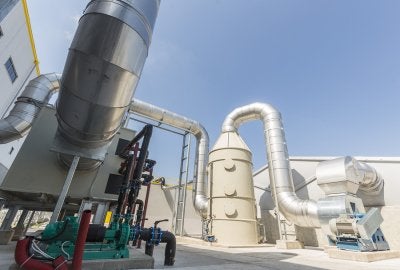
Solid Waste Disposal
Solid waste is non-hazardous, non-household waste that is generated during industrial manufacturing processes. Industrial solid waste management requires that the waste be evaluated, either by laboratory testing or documenting its characteristic, to determine whether or not it is hazardous. Common forms of industrial solid waste include empty containers, building materials, paint residue, sludge, tires, food waste, animal remains, and glass and plastic that can’t be recycled. Your local waste management company can perform waste disposal for all non-hazardous materials and waste.
Hazardous Waste Disposal and Recycling
Hazardous waste is any waste that is harmful to human health or the environment. This waste may be in liquid, solid, gas, or sludge form, and may include discarded industrial products or by-products. Hazardous industrial waste must often be stabilized and/or solidified prior to waste disposal. Hazardous waste disposal methods may include incineration, destruction, recycling, and isolation in landfills. Hazardous waste recycling involves reusing or reclaiming hazardous industrial waste. Waste is reclaimed when it is processed to recover a reusable product, or if it is regenerated. Some hazardous waste, like lead-acid batteries or electronic circuit boars, can be recycled into new products
Mixed Waste Disposal
Mixed waste consists of both radioactive and hazardous materials or components. The Resource Conservation and Recovery Act and the Atomic Energy Act regulate mixed waste disposal, and the U.S. Nuclear Regulatory Commission and the U.S. Department of Energy regulate radioactive waste disposal. Most industrial mixed waste is categorized as low-level mixed waste. Mixed waste management and waste disposal is significantly more expensive than radioactive waste; however, a waste generator can reduce the volume of mixed waste that is produced by industrial processes.
-
Waste Reduction Tips for Commercial Property Managers
As a commercial property manager, it’s very important for you to investigate opportunities to reduce, reuse, and recycle in Atlanta . Commercial properties produce a lot of waste, and typically pay quite a bit for waste disposal. These waste reduction tips will help you save money on waste disposal, reduce waste, and implement a commercial recycling program.

Reduce Waste Disposal Costs
The best way to reduce your company’s waste disposal costs is by identifying and eliminating inefficient waste generating processes within the company. Encourage employees to email documents back and forth for review, rather than printing them out. Instead of using disposable plates, cups, and cutlery in your kitchen or break room, provide employees with reusable items, or ask employees to bring their own dishes into the office. Use washable hand towels or dish cloths in the bathrooms and kitchen instead of paper towels. When purchasing for the company, never buy more than what you absolutely know you’ll need, especially when purchasing perishable or seasonal items.
Reuse Valuable Materials
Train your employees to be on the lookout for ways to reuse valuable materials whenever possible. If they frequently need to print out draft copies of documents, or if they print something by mistake, they can save the paper for reuse. This paper can be made available to the entire office for use as communal scratch paper or note taking paper. It can even be fed back into the printer upside down, so that another document draft can be printed on the other side. Use rechargeable batteries throughout the office, and reuse envelopes and packaging material whenever possible.
Recycle Usable Goods
Ask your local recycling center for information about the office materials they are capable of recycling. Most recycling centers can recycle plastics, film, wood, electronics, paper, and cardboard. Set up recycling bins around the office, and make sure employees understand basic recycling facts, and know which materials can and can’t be recycled. You should also try to buy recyclable goods or recycled goods whenever possible.
-
The Advantages of Effective Waste Management in the Hospitality Industry
An effective waste management system is comprehensive, and focuses on reducing waste, reusing valuable materials, and recycling in Atlanta . Commercial processes, particularly those used in the restaurant and hotel industry, tend to generate a lot of waste, and require regular, costly waste disposal. Developing an effective waste management program that will significantly reduce your waste disposal costs, as well as offer these other great advantages.
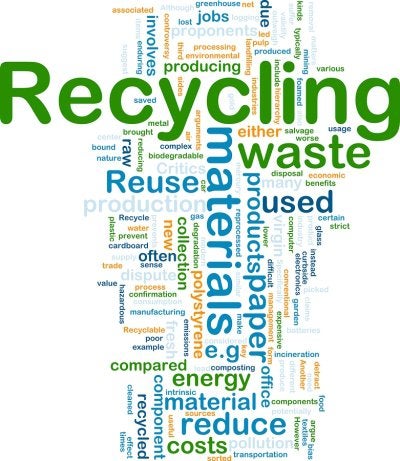
You Can Significantly Reduce Waste Disposal Costs
A comprehensive waste management program affords you the tools and resources to critically evaluate the amount of waste you generate. You can then implement waste reduction strategies that will significantly reduce your waste disposal costs. This may include using refillable dispensers for soap, shampoo, and conditioner in bathrooms, using washable and reusable cloth products and dishware, switching to LED lighting, using filtered water instead of bottles, reducing and reusing packaging supplies, and reducing the amount of paper products used when printing or distributing materials.
Recycling Programs Benefit the Environment
A recycling program will reduce your waste disposal costs and benefit the environment. Recycling centers can recycle paper, cardboard, metal, film, plastic, electronics, food waste, fryer oil, wood, and glass. Implementing an effective recycling program will also make your company more attractive to customers and clients, as the majority of people appreciate eco-friendly business practices. Make sure that you place recycling bins in prominent, convenient areas, and clearly post recycling facts and information in common areas for your employees and customers to reference.
Donating Reusable Items Benefits the Community
Though your company may no longer be able to use an item, it can still be valuable to others in the community. You can donate reusable items to charitable organizations, and provide a direct benefit to community members in need. Food waste can be used by farmers, or as composting for community gardens. Furniture, electronics, blankets, linens, towels, and old employee uniforms can be donated to animal shelters, homeless shelters, and other relief agencies. Packaged food can be donated to the food bank or local shelters or soup kitchens.
-
What Are the Parts of a Commercial Waste Management System?
Commercial waste management services consist of recycling programs, analyzing waste production, reducing waste, and waste disposal in Atlanta . Your waste management company will provide you with trash cans, dumpster rentals, and recycling bins that are large enough to meet the needs of your waste and recycling volume, as well as your trash pickup, waste disposal, and recycling schedule.
Trashcans should be placed in convenient areas around your building, and should be easily accessible to employees and guests. Employees should know how often the trashcans should be emptied in outdoor dumpsters. They should also be aware of your company’s trash pickup schedule. Recycling bins should also be easily accessible, and employees and guests should have access to your company’s recycling facts and information.
Roll off dumpsters may be included in your waste disposal program, and should be placed far enough away from the building that the noise and smell won’t affect employees or guests. You should schedule your trash pickup frequently enough that the dumpsters aren’t completely full or overflowing when the trash company comes. This will prevent the dumpsters from smelling or becoming unusable.
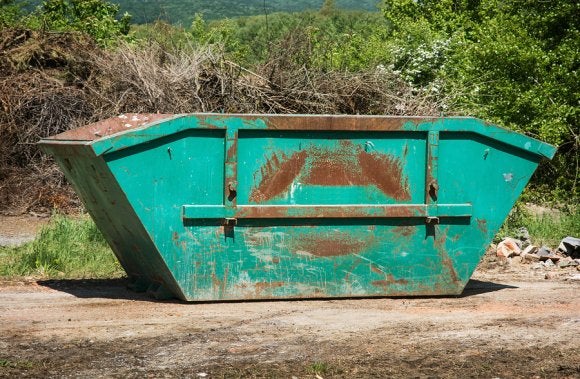
-
Spotlight on Industrial Waste Considerations
Factories, warehouses, and automotive centers are responsible for the majority of industrial waste in Atlanta . In order to maintain the safety, cleanliness, and efficiency of an industrial building, it’s crucial to have a comprehensive waste management program. A comprehensive waste management program consists of reducing waste production and waste disposal costs, reusing or donating reusable materials, and implementing a strong recycling program.
Your waste management company should provide you with dumpsters and recycling bins that are large enough to meet your needs. Make sure that these are strategically placed so that they are easily accessed by employees, yet won’t impede efficiency or safety. Your waste management company should also provide you with statistical information about the volume and type of waste you produce, so that you can efficiently and effectively schedule waste disposal, trash pickup, and recycling services.
Your employees should be aware of the details of your recycling program, and should have access to all crucial recycling facts. They should understand which materials can be recycled, and which can be reused. They should also understand important waste reduction strategies.
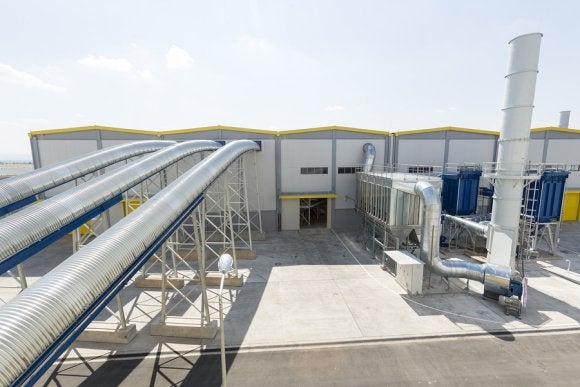
-
Getting the Facts About Food Waste
Food waste in Atlanta is a serious and ongoing issue. The hospitality industry generates a great deal of food waste, and implementing key waste reduction strategies can reduce much of that waste. If you work in the hospitality industry, you can work with your waste management company to reduce food waste, and you can also recycle necessary food waste at your local recycling center.
Watch this video for some important facts about food waste. After watching the clip, talk to your employees about implementing a zero waste initiative that will identify and reduce food waste, and help you develop more sustainable food processes.
-
A Look at a 50-Ton Dumpster in Action
Dumpster rentals in Atlanta are a crucial element of any effective waste management plan. A roll off dumpster rental allows you to collect a high volume of trash and waste in a centralized location until trash pickup day, and also protects the public from the sight and smell of the waste disposal process.
Watch this video clip for a first-hand look at a 50-ton roll off dumpster being picked up by a trash company. Once the waste within the dumpster has been emptied into the back of the dumpster truck, it will be taken to a landfill for waste disposal.
-
Essential Tips for Reducing Restaurant Waste
All businesses generate a significant amount of waste near Atlanta, but there are different ways you can go about disposing of it. Restaurants may deal with a particularly substantial amount of waste, which is why it helps to be responsible when it comes to waste disposal. From regularly refining your menu to disposing of your waste in a more responsible manner, there are many steps you can take to cut down on waste. Here are some essential tips for reducing restaurant waste.
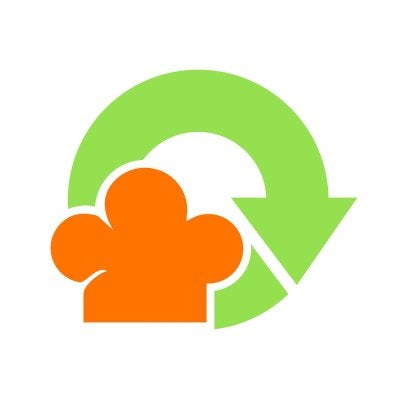
Consistently Evaluate Your Menu
Your restaurant’s menu is a piece of art, and it deserves careful consideration. Since it is also a part of your business, however, it should be reevaluated on a regular basis. While underdeveloped nations survive on minimal amounts of food, many developed nations waste incredible amounts of perfectly good food products. People tend to stick to what they like when they order food at a restaurant, but there is still a great deal of waste. Keep an eye on what your plates look like when they return at the end of a meal; if you notice that a few meals in particular are rarely finished, consider adjusting your portion size or changing the recipe. This will keep more food in stomachs and less in landfills.
Recycle Everything You Can
One of the most prevalent forms of reducing waste is recycling, and your restaurant is capable of jumping on board. With today’s societal shift towards environmental consciousness, recycling is simple. Separate your recyclables in order to keep them out of landfills, and make sure you have both garbage cans and recycling bins available in your establishment. You can even recycle oil and cooking grease; biodiesel firms can make use of these byproducts, so avoid throwing them away.
Compost Your Waste
A large percentage of waste that a restaurant generates is food waste, but food waste does not have to end up in the trash. Consider starting a composting program in order to put your food waste to better use. Through a composting system you can use your food waste to enrich soil and help the environment instead of hurt it.
-
Creating a Nursing Home Waste Management Plan
There are very specific and strict guidelines in place for nursing home waste management in Atlanta . Any medical facility that generates medical waste must develop a comprehensive waste management program that meets all of the medical waste disposal and recycling regulations that are in place. Here’s how you can make sure that your nursing home is meeting your state’s waste management requirements.
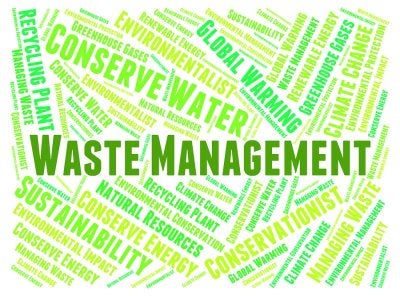
Investigate Your Recycling Options
Your employees and tenants should be given the opportunity to recycle their reusable materials whenever possible. Contact your local recycling center to find out what materials they’re capable of recycling. Set up recycling bins throughout the building in convenient, easy to reach locations. Make sure that employees and tenants understand all necessary recycling facts, like the location of recycling bins, when they’re picked up, and what materials can and can’t be recycled. Recycling centers may offer paper, scrap metal, electronics, plastic, film, universal waste, food waste, fryer oil, and recycling.
Reduce Your Waste ProductionEncourage your employees and tenants to make an effort to reduce waste production. Suggest that they use reusable dishes and cutlery for their meals, rather than disposable ones. Organize tenant swap meets, at which tenants can bring unused or unneeded items to a central location to donate to or swap with other tenants. Reuse packaging materials, like boxes, envelopes, and bubble wrap. Discourage employees from unnecessarily printing out company emails, memos, or documents. Only purchase recyclable items, recycled items, and reusable items. Buy goods in bulk, and buy goods that utilize minimal packaging.
Conform With Medical Waste Disposal Regulations
While many items and materials can be reused and recycled, there are strict state and federal regulations concerning medical waste disposal. Used sharps, such as needles, lancets, and syringes, can never be reused. They can only be disposed of in designated sharps containers. Used medical gloves, bandages, tissues, cotton swabs, and other medical products should be secured in plastic bags before waste disposal or trash pickup. Ask your red bag waste disposal company if they offer reusable red bag medical waste disposal containers.
-
Setting Up Bulk Waste Removal Services
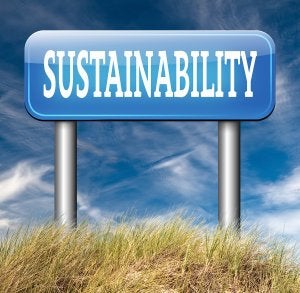 If your company produces commercial or industrial waste in Atlanta , you may want to set up bulk waste removal services with your local waste management company. This service allows you to remove large, unwanted items from the premises. Junk removal and waste removal frees up space, and significantly reduces the risk of potential health and safety issues.
If your company produces commercial or industrial waste in Atlanta , you may want to set up bulk waste removal services with your local waste management company. This service allows you to remove large, unwanted items from the premises. Junk removal and waste removal frees up space, and significantly reduces the risk of potential health and safety issues. A bulk waste removal service provides waste disposal for appliances, electronics, computers, furniture, construction waste, and even furniture. These materials can be reused and recycled at a local recycling center. By implementing a bulk waste removal program for your business, you can reduce waste, reuse and recycle valuable materials, and decrease your waste disposal costs.
An effective waste and junk removal service can reduce fire hazards and company liability by picking up and disposing of cumbersome items that may be preventing employees from moving freely about the building. Your business will also run more efficiently when your employees have more room for production.
RECENT POSTS
categories
- Uncategorized
- Waste Management Atlanta
- Waste Disposal and Recycling
- Hazardous Waste Disposal
- Chemical waste removal
- solid waste removal
- R3 Program
- Sustainable Organizations
- Sustainable Waste Removal
- Commercial Waste Removal
- Materials Management Program
- Dumpster Rental
- Roll Off Dumpsters
- Construction Site Waste Removal
- Sustainability
- Recycling in Atlanta
- Industrial Recycling
- Industrial Waste Removal Services
- Southern Waste & Recycling
- Waste Removal Atlanta
- Waste Specialists
- Atlanta
- Infographic
- Front Load Dumpsters
- Rear Load Dumpsters
- Reusable Electronics
- Dump Truck Atlanta
- Recyclable Electronics
- Trash Compactors
- Recycling
- Recycling Program
- Office Recycling
- Metal Recycle
- Electronic Waste
